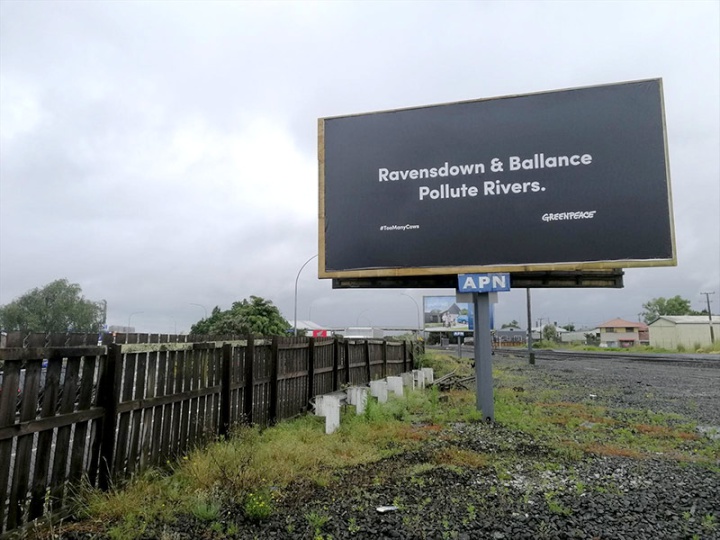Provocative billboards target Ravensdown and Ballance
Provocative billboards target Ravensdown and Ballance over river pollution

Thursday 6th December: Greenpeace is pulling no punches in its new campaign to ban synthetic nitrogen fertiliser and save New Zealand’s rivers.
The environmental organisation has installed provocative billboards on arterial routes around the country in time for the summer.
The no-frills billboards read; ‘Ravensdown and Ballance pollute rivers. #TooManyCows’.
On the latest tactic Greenpeace campaigner Gen Toop says "Ravensdown and Ballance are the river and climate polluters that many New Zealanders have never heard of. Our billboards are just the first step in making these dirty companies a household name."
Two of the Greenpeace billboards are being installed just a stone’s throw from the Ravensdown company headquarters in Christchurch and Ballance’s in Mount Maunganui.
Ravensdown and Ballance together supply 98% of all fertiliser to NZ farms.
Greenpeace has taken issue with synthetic nitrogen fertiliser because of its links to the industrialisation of agriculture, particularly dairying.
"Synthetic nitrogen fertiliser is the fuel that drives industrial dairying. It’s spread onto New Zealand dairy farms to grow more grass for too many cows" says Toop.
The use of synthetic nitrogen fertiliser in New Zealand has increased seven-fold since 1990. In the same period, dairy cow numbers have doubled. The dairy industry is the biggest user.
"Too many cows and too much synthetic nitrogen fertiliser is trashing our rivers and causing climate breakdown."
Synthetic nitrogen fertiliser acts as a double whammy, damaging both rivers and the climate.
Increasing the number of cows through the use of synthetic nitrogen increases the amount of nitrate pollution getting into rivers from urine patches. On top of that the product can directly run off and leach nitrate pollution into waterways.
For the climate, the increase in cows causes increases in ruminant methane emissions and nitrous oxide emissions from urine patches. On top of that, synthetic nitrogen fertiliser can directly emit nitrous oxide - a dangerous and long-lived greenhouse gas.
Synthetic nitrogen fertiliser is also the main cause of the breach in the safe planetary boundary for the nitrogen cycle. Scientists have identified the 9 ‘safe planetary boundaries’ as the set of ecological limits within which we must stay if the planet can continue sustaining human life.
The impacts of the nitrogen cycle breach are already being seen around the world, in the rapid growth in freshwater pollution, oceanic dead zones, and the spike in nitrous oxide emissions.
Greenpeace is unequivocal about the urgency and scale of action needed on the issue.
"We are facing mass starvation, human displacement and suffering, and extinction of wildlife because of climate change. Meanwhile, our rivers and lakes are dying, and our drinking water is becoming contaminated,"says Toop.
"We are literally going to hell in a handbasket if this Government refuses to take serious action against industrial livestock farming and its enabler, synthetic nitrogen fertiliser."
Regenerative farming methods have been proven to produce the same amount of food, and retain farmer profitability without using any synthetic nitrogen fertiliser.
"The Government must ban synthetic nitrogen fertiliser, reduce cow numbers and massively invest in regenerative farming," says Toop.
ENDS


 Gordon Campbell: On What’s Wrong With The Treaty Principles Bill
Gordon Campbell: On What’s Wrong With The Treaty Principles Bill Watercare Services: No Cause For Concern After Slightly Elevated Levels Of Arsenic Detected In Treated Waikato River Water
Watercare Services: No Cause For Concern After Slightly Elevated Levels Of Arsenic Detected In Treated Waikato River Water Te Pāti Māori: Government’s First Year A ‘Catastrophe For Māori’
Te Pāti Māori: Government’s First Year A ‘Catastrophe For Māori’ Department Of Internal Affairs: Samoan Citizenship Bill Passes Into Law
Department Of Internal Affairs: Samoan Citizenship Bill Passes Into Law NZ National Party: National Acknowledges The Passing Of Hon Nikki Kaye
NZ National Party: National Acknowledges The Passing Of Hon Nikki Kaye Mana Mokopuna: Children And Young People Share Vital Insights On Healing From Family Violence And Sexual Violence In New Report
Mana Mokopuna: Children And Young People Share Vital Insights On Healing From Family Violence And Sexual Violence In New Report NZ Government: PM Marks One Year In Government
NZ Government: PM Marks One Year In Government


